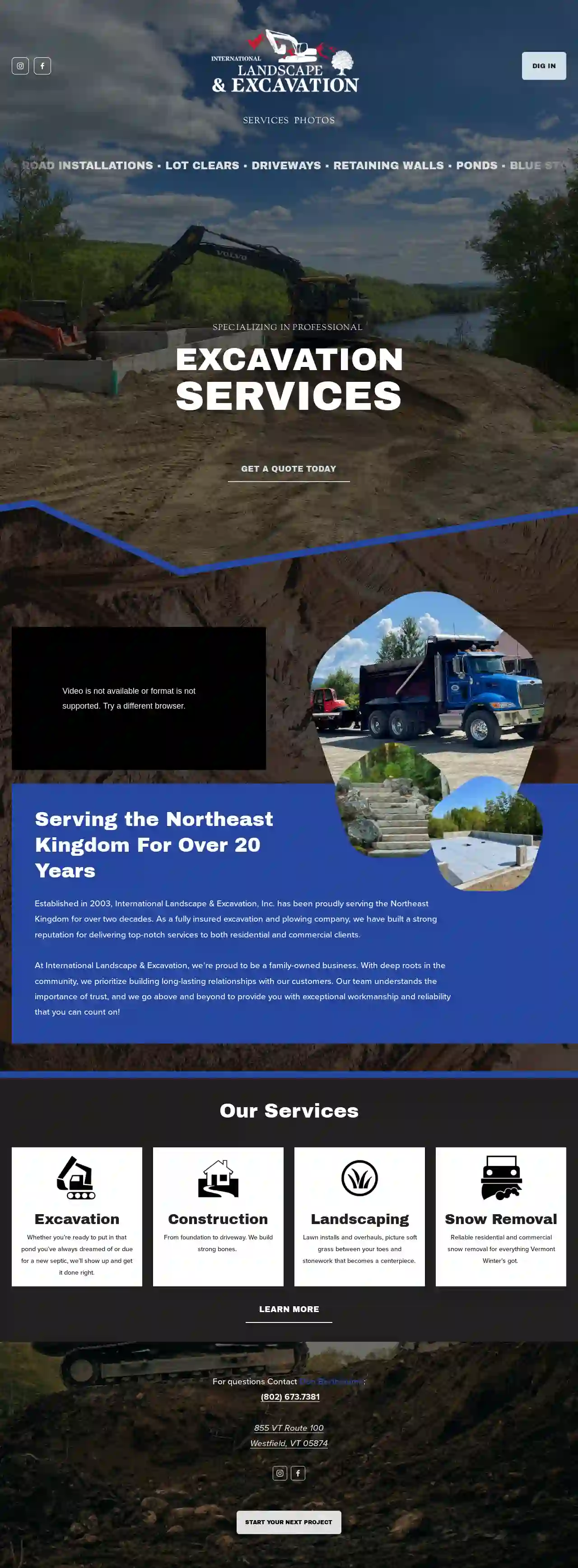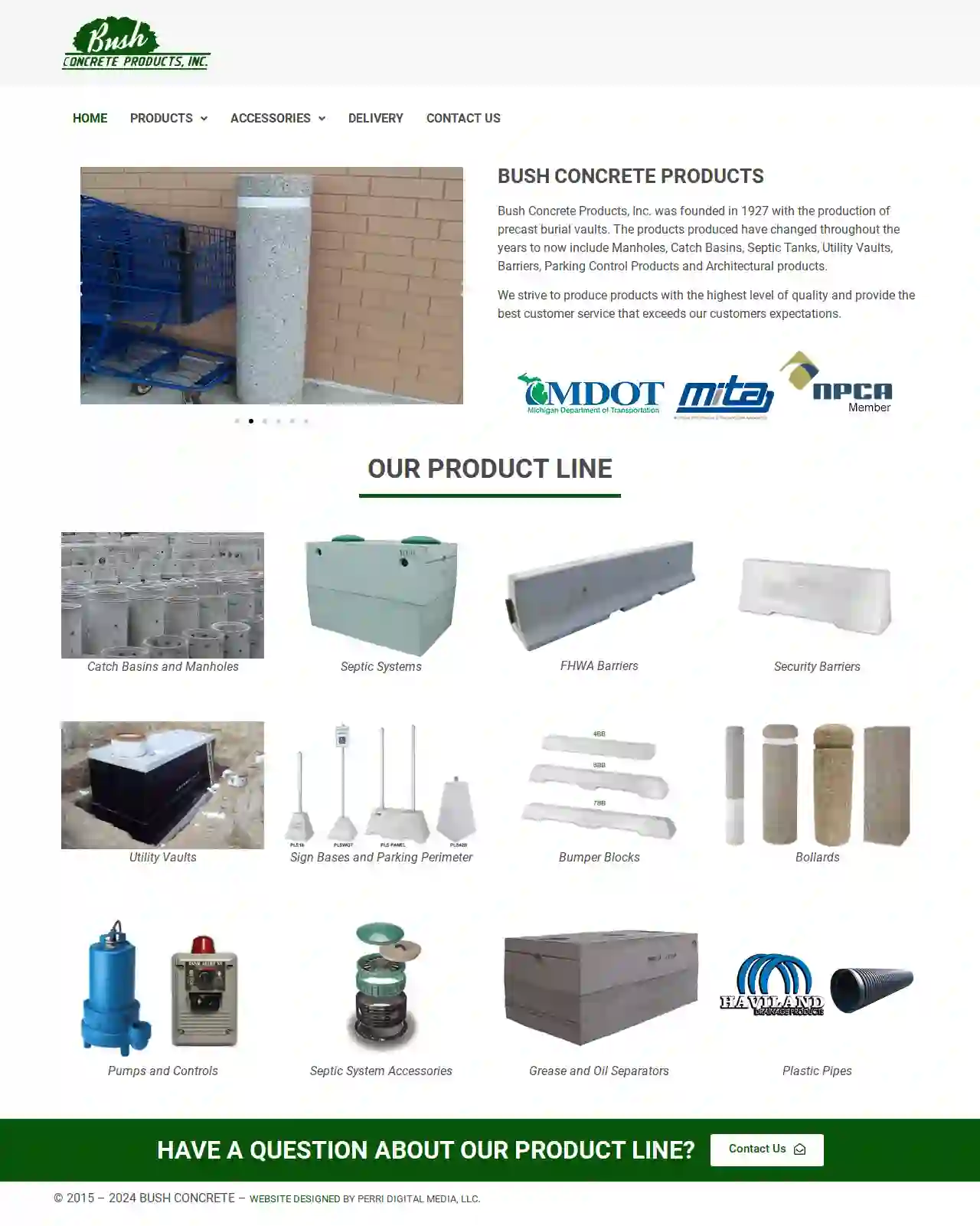Demolition Contractors Dakota Ridge
Find top Demolition Companies in Dakota Ridge
Receive up to 3 Demolition Contractors quotes for your project today! Compare profiles, reviews, accreditations, portfolio, etc... and choose the best deal.

Complete Excavation & Septic Services LLC
5117 reviews698 Main St, Isle La Motte, 05463, USDelivering Outstanding Site Preparation and Septic Services in Grand Isle, Franklin & Chittenden Counties, Vermont and Clinton County, New York At Complete Excavation & Septic Services our dedication to excellence begins with clear and effective communication. From the moment you reach out for a quote to our first day on the job, you'll experience the distinctive approach that sets us apart. With years of experience in both Excavation and Septic services, we understand the importance of asking the right questions and maintaining transparent communication to transform your vision into reality. We work diligently to eliminate unexpected surprises, consistently delivering positive outcomes that not only meet but often exceed your expectations. But you don't have to take our word for it – let our satisfied customers share their experiences. Our track record of success spans numerous years, during which we've collaborated with homeowners, and businesses on a wide range of projects. Whether it's excavation, road construction, site development, land clearing, trenching, demolition, or resolving drainage issues, we have the hands-on experience and equipment to impress you with our unwavering commitment to excellence in comprehensive site preparation and septic services.
- Services
- Why Us?
- Gallery
Get Quote
chuckEX
4.79 reviewsBoulder, USAbout Us chuckEX was born out of a love of moving earth, big toys and a disdain for the ethics of many of the contractors who run them. Put simply, we enjoy what we do and we will do what we can to make it enjoyable for you as well. Our commitment is to be transparent with our customers about what we are doing and to bring to light the risks and costs involved. We strive to set expectations properly at the beginning, under-promise and over-deliver. Doing our best to expose possible surprises at the beginning of the project so that our customers have a clear picture of what the project entails. We want to take the anxiety out of excavation!
- Services
- Why Us?
- Testimonials
- Gallery
Get Quote
Colorado Hydrovac
423 25th Street, Greeley, 80631, USColorado Hydrovac and Environmental Services offer a wide variety of Hydro Excavating, and Construction Services. Ryan and Scott’s combined experience ensures each client receives the safest work practices, and ensures each job is done correctly and efficiently every time. Whether your job is large or small, call Tri-State Construction today for prompt, professional service. In addition to our Hydrovac excavation services, our construction division Tri-State Construction expands our offerings to better serve our clients throughout Colorado and surrounding states.
- Services
- Why Us?
- Gallery
Get Quote
HLG Excavation LLC
513 reviews1290 North Rd, 1290 North Rd Hinesburg, VT, Hinesburg, 05461, USProperty Excavation Experts You Can Trust HLG Excavation LLC is a family-owned-and-operated company in Hinesburg, VT that offers a comprehensive range of excavation services. Whether you need to move earth or stone, install a new septic system, or need site work for your new home, our team can take care of your excavation project from start to finish. We specialize in offering honest, reliable, and personalized services. We take great pride in our work because we provide services of exceptional quality and attention to detail. Our services are unmatched in the industry because we always ensure that our clients’ needs come first. You can also count on us to stick to your budget and schedule each time we work on a project. Ask any of our clients about our commitment to detail and ability to do the job right the first time, and they will confirm that we are a team you can count on.
- Services
- Why Us?
- Our Team
- Testimonials
- Gallery
Get Quote
International Excavation, Inc.
56 reviewsVT Route 100, Westfield, 05874, USInternational Landscape & Excavation, Inc. - Serving the Northeast Kingdom for Over 20 Years Established in 2003, International Landscape & Excavation, Inc. has been proudly serving the Northeast Kingdom for over two decades. As a fully insured excavation and plowing company, we have built a strong reputation for delivering top-notch services to both residential and commercial clients. At International Landscape & Excavation, we’re proud to be a family-owned business. With deep roots in the community, we prioritize building long-lasting relationships with our customers. Our team understands the importance of trust, and we go above and beyond to provide you with exceptional workmanship and reliability that you can count on!
- Services
- Why Us?
- Gallery
Get Quote
Bush Concrete Products Inc.
4.717 reviews3584 Airline Road, Muskegon, 49444, USAbout Bush Concrete Products Bush Concrete Products, Inc. has been a trusted name in the concrete industry since 1927, starting with the production of precast burial vaults. Over the years, we've expanded our product line to include a wide range of high-quality concrete solutions for various applications. Today, we offer a comprehensive selection of products, including Manholes, Catch Basins, Septic Tanks, Utility Vaults, Barriers, Parking Control Products, and Architectural products. At Bush Concrete Products, we are committed to delivering exceptional quality and customer service. We strive to exceed our customers' expectations with every product and interaction. Our team is dedicated to providing expert guidance and support throughout your project, ensuring you receive the best possible experience.
- Services
- Why Us?
- Gallery
Get Quote
Towne Excavating LLC
51 reviews123 Main Street, City, 00000, USTowne Excavating LLC: Your Trusted Partner for Excavation Services Towne Excavating LLC is a family-owned and operated business with a strong commitment to providing high-quality excavation services to residential and commercial clients in the [City, State] area. We have a team of experienced and skilled operators who are dedicated to delivering exceptional results on every project. We understand that excavation projects can be complex and require careful planning and execution. That's why we take a personalized approach to every job, working closely with our clients to ensure their needs are met and their expectations are exceeded. From site preparation to utility installation, we have the expertise and equipment to handle a wide range of excavation projects. We are committed to safety and environmental responsibility, and we always strive to minimize disruption to our clients' properties. At Towne Excavating LLC, we believe in building strong relationships with our clients. We are dedicated to providing excellent customer service and ensuring their complete satisfaction. Contact us today to discuss your excavation needs and let us show you why we are the trusted partner for all your excavation projects.
- Services
- Why Us?
Get Quote
Dirt Dogs Excavating, Grading, and Land, LLC
4.911 reviewsElizabeth, Colorado, USWelcome to Dirt Dogs Grading & Land LLC A Professional Excavating and Grading Company Dirt Dogs Excavating is a professional excavating and grading company committed to excellence and offering both commercial and residential excavation, grading and trenching services. Whether you need excavation, earth moving or foundation excavation for a new home, horse barn or arena, driveway, road grading or landscaping project, our qualified personnel recognize the importance of completing a quality project on time and on budget. This is achieved with our constant attention to detail and our dedication to getting the job done right. We build enduring relationships with our clients through honest communication, trust and reliability. We serve clients from Elizabeth, Franktown, Parker, Castle Rock, Colorado and surrounding areas.
- Services
- Why Us?
- Testimonials
- Gallery
Get Quote
Smith Excavating
52 Lazy Acres, Chittenden, 05763, USSmith Excavating: Your Trusted Partner for Excavation in Central Vermont Smith Excavating Corporation is a family-owned and operated excavating business in Central Vermont, established by Wendell (Stub) Smith in 1977. Now managed by his son, Evan Smith, the company has a rich history of providing high-quality excavation services to both residential and commercial clients. Over the years, Smith Excavating has built a reputation for reliability, expertise, and dedication to customer satisfaction. Their fleet of equipment, ranging from small to large, allows them to handle projects of all sizes, ensuring they can meet the unique needs of each client. From simple lawn repairs to complex site development, Smith Excavating has the experience and resources to tackle any excavation project. Whether you need a new driveway, foundation work, septic system installation, or retaining wall construction, their team is equipped to deliver exceptional results. Smith Excavating is committed to providing personalized service and working closely with clients to ensure their vision is realized. They understand the importance of clear communication, timely completion, and exceeding expectations. Their dedication to quality and customer satisfaction is evident in every project they undertake.
- Services
- Why Us?
- Our Team
- Testimonials
- Gallery
Get Quote
Chris Wells Excavation LLC
57 reviews493 Vermont Route 15, Underhill, 05489, USAbout Us I am an experienced equipment operator, mason, and contractor. I am committed to finding a cost-effective solution to your excavation needs. Call to schedule a site visit and free estimate.
- Services
- Why Us?
Get Quote
Over 22,076+ Excavation Contractors onboarded
Our excavation pros operate in Dakota Ridge and surroundings!
ExcavationHQ has curated and vetted the Best Excavation Pros near Dakota Ridge. Find a top & reliable contractor today.
Frequently Asked Questions About Demolition Contractors
- Project Assessment: The demolition contractor evaluates the structure, site conditions, and project requirements.
- Permitting: Obtain necessary demolition permits from local authorities.
- Site Preparation: Secure the site, disconnect utilities, and remove any valuable or reusable items.
- Hazardous Material Abatement: Professionally remove asbestos, lead paint, or other hazardous materials if present.
- Demolition: Execute the chosen demolition method, bringing down the structure safely and efficiently.
- Debris Removal and Site Cleanup: Sort, process, and dispose of demolition debris responsibly. Clean up the site to prepare it for future use.
- Waste Generation: Demolition generates a large volume of debris, contributing to landfill space and potentially releasing harmful substances into the environment if not disposed of properly.
- Air Pollution: Dust and particulate matter released during demolition can impact air quality, affecting human health and the environment.
- Noise Pollution: Demolition activities can generate significant noise, disturbing nearby residents and wildlife.
- Resource Depletion: Demolition consumes resources that could be salvaged and reused, contributing to resource depletion and environmental degradation.
- Size and Complexity of the Structure: Larger and more complex structures, such as multi-story buildings, require more time, labor, and specialized equipment, increasing costs.
- Type of Demolition: Different demolition methods, such as implosion, wrecking ball, or high-reach demolition, have varying costs.
- Material Disposal: Disposal fees for demolition debris can contribute significantly to the overall cost, depending on the type and quantity of materials.
- Location and Accessibility: Demolition in densely populated areas or with limited access may require more planning and specialized equipment, affecting costs.
- Hazardous Materials: The presence of asbestos, lead paint, or other hazardous materials requires specialized removal and disposal procedures, adding to the expenses.
- Recycling: Concrete, brick, metal, and wood can be recycled and reused in other construction projects, reducing waste sent to landfills.
- Landfill Disposal: Non-recyclable materials are disposed of in designated landfills according to local regulations.
- Donation: Some materials, such as fixtures or appliances, may be suitable for donation to charitable organizations.
What are the steps involved in a typical demolition process?
What are the environmental impacts of demolition?
How much does demolition cost in the USA?
What happens to the debris after demolition?
What are the steps involved in a typical demolition process?
- Project Assessment: The demolition contractor evaluates the structure, site conditions, and project requirements.
- Permitting: Obtain necessary demolition permits from local authorities.
- Site Preparation: Secure the site, disconnect utilities, and remove any valuable or reusable items.
- Hazardous Material Abatement: Professionally remove asbestos, lead paint, or other hazardous materials if present.
- Demolition: Execute the chosen demolition method, bringing down the structure safely and efficiently.
- Debris Removal and Site Cleanup: Sort, process, and dispose of demolition debris responsibly. Clean up the site to prepare it for future use.
What are the environmental impacts of demolition?
- Waste Generation: Demolition generates a large volume of debris, contributing to landfill space and potentially releasing harmful substances into the environment if not disposed of properly.
- Air Pollution: Dust and particulate matter released during demolition can impact air quality, affecting human health and the environment.
- Noise Pollution: Demolition activities can generate significant noise, disturbing nearby residents and wildlife.
- Resource Depletion: Demolition consumes resources that could be salvaged and reused, contributing to resource depletion and environmental degradation.
How much does demolition cost in the USA?
- Size and Complexity of the Structure: Larger and more complex structures, such as multi-story buildings, require more time, labor, and specialized equipment, increasing costs.
- Type of Demolition: Different demolition methods, such as implosion, wrecking ball, or high-reach demolition, have varying costs.
- Material Disposal: Disposal fees for demolition debris can contribute significantly to the overall cost, depending on the type and quantity of materials.
- Location and Accessibility: Demolition in densely populated areas or with limited access may require more planning and specialized equipment, affecting costs.
- Hazardous Materials: The presence of asbestos, lead paint, or other hazardous materials requires specialized removal and disposal procedures, adding to the expenses.
What happens to the debris after demolition?
- Recycling: Concrete, brick, metal, and wood can be recycled and reused in other construction projects, reducing waste sent to landfills.
- Landfill Disposal: Non-recyclable materials are disposed of in designated landfills according to local regulations.
- Donation: Some materials, such as fixtures or appliances, may be suitable for donation to charitable organizations.